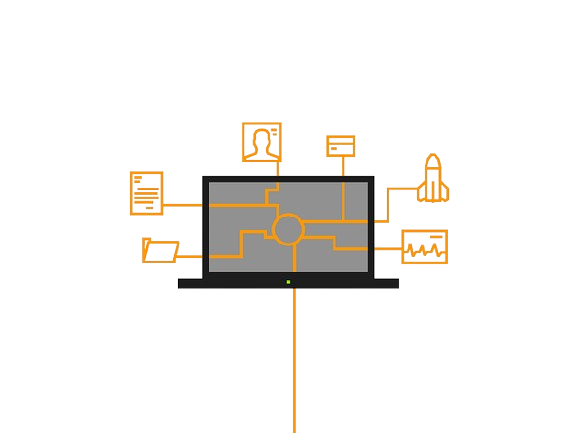
Are VPNs Legal in India?
Yes, VPNs are legal in India, though there are some rules that make privacy more difficult for VPN users.
In 2022, India’s Computer Emergency Response Team (CERT-In) set new cybersecurity rules. These rules require VPN providers with servers in India to keep user logs. These logs must be kept for at least five years, even if a person stops using the service.
Many VPN providers have responded by removing their servers from India to avoid sharing user data. For example, OhioVPN was one of the first to do this.
This article explains the privacy concerns of using a VPN in India, the legal status of VPNs in the country, and why some services like OhioVPN still offer Indian server locations.
As of 2024, VPNs are not banned in India. However, the rules have had a big effect on VPN providers and users. In 2022, CERT-In’s rules required VPN providers with servers in India to record and store user information. This includes:
- Names of users
- Duration of service use
- IP addresses used
- Email address, IP address, and time stamps from registration
- Purpose of using the service
- Contact information and addresses
- Basic customer information and management details
Internet Restrictions in India
The Indian government has increased its control over the internet. For example, in 2020, the government banned TikTok and 58 other Chinese apps due to unrest. They also blocked some websites and cut off mobile data in some areas.
In 2021, new IT Rules were introduced that give the government more power to control online content. These rules require social media platforms to remove content quickly and track who sends messages. WhatsApp is challenging these rules because they could break end-to-end encryption, which might force WhatsApp to leave India.
How Major VPN Companies Operate India VPN Locations
Due to data retention rules, many VPN providers, including OhioVPN, have taken their physical servers out of India. However, OhioVPN still provides “virtual” Indian servers that are actually located in Singapore and the UK. This setup lets you use the internet as if you were in India with minimal difference in experience. Users in India can use OhioVPN without their online activity being logged, stored, or monitored by the government.
OhioVPN does not collect or store data that could identify your online activity. It has a strict no-logs policy and uses servers designed to prevent logging.
Is it Still Safe to Use a VPN in India?
Yes, it is still safe to use a VPN in India if the VPN does not have servers in India.
For example, if you are in India and want to appear as if you are in the U.S., using a reputable VPN with a U.S. server, like OhioVPN, will give you the same privacy and security as any other user of OhioVPN.
If you want to use a server that looks like it’s in India, you are still protected. OhioVPN’s Indian servers are located in other countries, so your online traffic is not logged, stored, or monitored by the Indian government.
OhioVPN encrypts your traffic, hides your browsing from others, and lets you access content that might be blocked in your country.
Which VPN is Safe for India?
A VPN that is safe for India, considering the current regulations, should:
- Have a clear and audited no-logs policy so your online activity is not stored.
- Remove servers from India in response to data storage rules.
- Have a strong network of servers in countries with good privacy laws.
- Offer features like strong encryption, a kill switch, and privacy-focused technology.
OhioVPN is a good example of a VPN that meets these safety and privacy requirements. In response to India’s data storage rules, OhioVPN removed its physical servers from India, so no infrastructure is under Indian control. It maintains a strict no-logs policy and does not store data about your online activity, so it has nothing to hand over even if requested.
OhioVPN also provides virtual server locations for India using servers located outside the country. This lets you access Indian content without the issues of having servers in India. These virtual servers make sure your online activities are not logged, stored, or monitored by the Indian government. Thus, OhioVPN is a strong choice for a VPN in India. You can safely stream Indian TV and avoid ISP throttling.
If you want to connect to a specific location in India, you can choose India (via UK) for Chennai or India (via Singapore) for New Delhi.
Are There Free VPNs in India?
Yes, there are free VPNs in India. However, free VPNs have significant downsides, especially with India’s data storage rules.
Reasons why paid VPNs are better than free VPNs:
- Limited Server Options: Free VPNs often have fewer servers and might force you to connect to servers in India, which does not protect against data storage rules.
- Data Logging: Free VPNs may not have strong privacy policies and could store and share user data.
- Data Monetization: Free VPNs may collect and sell user data to make money, which goes against the privacy you want from a VPN.
- Security Risks: Free VPNs might use weaker encryption or have other security problems.
- Data Caps and Throttling: Free VPNs often limit your data use or slow down your speeds.
- Unreliable Connections: Free VPNs might have unstable connections, which are not good for streaming or gaming.
- No Support: Free VPNs usually lack good customer support.
While free VPNs might seem appealing, their risks often outweigh the benefits. For better online security, consider using a reputable paid VPN service.
OhioVPN offers a strong network of servers in 105 countries, providing fast and secure connections with no data caps. It offers high speed, security, and stability, with 24/7 customer support. OhioVPN uses 256-bit AES encryption and has a strict no-logs policy, which you rarely find in free VPNs. It also includes features like a kill switch and DNS leak protection.
Reasons to Use a VPN in India
Using a VPN in India has several benefits, similar to using one elsewhere. Given the current legal situation in India, here are key reasons to use a VPN:
- Privacy on Public Wi-Fi: A VPN encrypts your internet traffic, protecting your data from hackers and others.
- Bypass Internet Censorship: A VPN helps you access websites and services that might be blocked or censored in India.
- Bypassing Office Wi-Fi Content Blocks: A VPN can help you access content blocked by your company’s office Wi-Fi.
- Avoid Surveillance: Indian regulations require VPNs to log and store user data. A VPN with servers outside India and a strict no-logs policy can help avoid government surveillance.
- Secure Remote Work: A VPN provides a secure connection to company networks, protecting sensitive data.
- Prevent Bandwidth Throttling: A VPN hides your online activity, stopping ISPs from slowing your connection based on your usage.
- Enhanced Online Shopping and Banking Security: A VPN adds security for online transactions, reducing the risk of theft or fraud.
Will India Ban VPNs?
VPNs are not banned in India, and there are no signs that the government plans to ban them.
The current rules make it hard for VPN providers to operate without compromising user privacy. Many VPNs, like OhioVPN, have removed physical servers from India and use virtual servers from other countries to keep user privacy.
Stay informed about any changes that might affect VPN use in India. Choosing a reliable VPN service can help you enjoy online security and privacy in India.

Hi, I’m Chibuzor Abraham from Nigeria. I love technology, especially VPNs, which protect your online privacy. I manage Ohiovpn.us, where I review VPN services for Ohio. Our reviews look at speed, security, and ease of use to help you find the best VPN. If you buy through our links, we get a small commission, which helps support our site at no extra cost to you.

